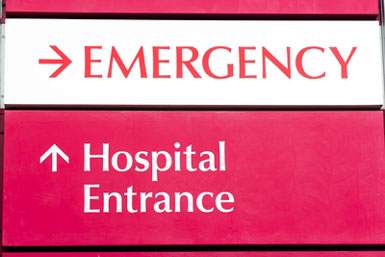Next week is America Saves Week, sponsored by our friends at America Saves. Their goal is to get people to take the Savings Pledge and start saving a little bit at a time with their eye on a bigger goal. It’s an idea we support whole-heartedly. 
One of the things they suggest saving for is an emergency savings account. If you’re a regular reader of this blog, you know emergency savings are something we talk about often. But recently I had a personal experience that truly drove home the importance of having an emergency savings account funded with at least three months of living expenses.
I spent the better part of January sick with what was initially diagnosed as bronchitis, but was ultimately pneumonia. After weeks of no improvement and feeling worse than I ever had, I went to the emergency room and was promptly admitted to the hospital for treatment.
When I heard the E.R. doctor say, “You’re not going home; we need to admit you,” my stomach dropped. I had already missed several days of work, and would clearly be missing several more. I had spent quite a bit on doctor’s visits and prescriptions and knew a hospital stay would take that total to a whole new level (even with my medical insurance).
I was afraid of missing more work and knew I was closing in on the amount of time off I had accrued, and would be facing an unknown amount of unpaid time. My mind was racing with a thousand “what if” questions. And then I remembered: I have emergency savings; it’s going to be OK.
I was admitted to the hospital on a Sunday evening. The first nurse I had was friendly but no-nonsense. She told me, “Forget about whatever else is going on in your life. Your only job the next few days is to get better.”
I’ve been building up emergency savings for a long time; I probably have at least six months of living expenses saved. And I was never happier to have it than I was at that moment. I knew that no matter what happened in the short term, I’d be able to take care of myself and pay my bills.
That doesn’t mean the “what if” thoughts didn’t happen. But every time panic or doubt crept in, remembering that my emergency savings would be there if I needed it brought me peace of mind and allowed me to focus on getting better.
Fortunately, my hospital stay was only four days. I haven’t yet received the final bill, so I don’t know if I’ll need to dip into my emergency savings to pay it. I’m hoping I can make payment arrangements with the hospital and leave my savings intact, in case something else happens down the line.
If you already have and are continuing to add to your emergency savings, keep it up. If you haven’t yet started, do it today. Save whatever amount you can. Make it a priority. And although it’s tempting to use for other things, don’t.
Life happens. Emergencies happen. Give yourself the gift of being ready for them.





